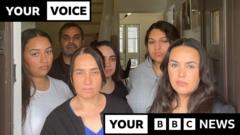Why Won't the Housing Association Act After Our Neighbor Threatened My Dad with a Knife?

Understanding the Impact of Anti-Social Behaviour on Communities
In recent years, anti-social behaviour (ASB) has emerged as a pressing issue that affects the quality of life for many individuals and families across the UK. The stories of those who suffer from nuisances such as noise, vandalism, and threats illustrate the severe emotional and psychological toll these experiences can take. This article delves into the various dimensions of anti-social behaviour, its impact on victims, and the systemic challenges faced in addressing these issues effectively.
The Case of Dilara and Her Family
Take the poignant case of Dilara, a 17-year-old beauty therapy student from South London, whose home has transformed from a sanctuary into a source of fear. Over the past year, her family has endured threats and violence from their next-door neighbour. Dilara's father, Ecevit, faced an alarming encounter when he asked the neighbour to lower the volume of her music at 4 AM. In response, she brandished a knife, leaving him shaken and fearful for his family's safety.
Such incidents are not isolated. Dilara's family represents a growing number of individuals who have reported similar experiences of intimidation and harassment. In fact, 66 people have reached out to local media, sharing their stories of how they have dealt with relentless ASB, highlighting a troubling trend in community safety.
The Consequences of Anti-Social Behaviour
The impact of these experiences extends beyond immediate fear. Dilara reports that the ongoing noise from her neighbour disrupted her studies during her GCSEs, and it continues to affect her college education. Exhaustion from sleepless nights has made her attendance at school increasingly difficult. She is not alone—many individuals in similar situations report heightened anxiety, stress, and a general decline in mental health.
According to the housing ombudsman, complaints related to anti-social behaviour have surged by 119% over four years, indicating a growing crisis. The rising number of incidents reflects a systemic failure to address these issues effectively, leaving many individuals feeling vulnerable and unsupported.
Community Responses and Failures
The response of housing authorities and local councils often falls short of what is needed to ensure residents feel safe. In Dilara's case, the housing association, Wandle, has faced criticism for its lack of decisive action against the neighbour's behaviour. Despite video evidence and numerous complaints, the association's efforts to resolve the situation have been slow and inadequate.
Challenges in Reporting and Resolving Anti-Social Behaviour
Many victims of anti-social behaviour feel that their complaints are dismissed or inadequately addressed by the authorities. For example, Cheryl, a resident of Shoreham-by-Sea, has endured four years of disruptive behaviour from her neighbours, including loud music and verbal abuse. Despite extensive documentation of her struggles, the local council has deemed her complaints "unfounded," further deepening her sense of isolation and despair.
- Victims often report feeling ignored or belittled by authorities.
- There is a prevalent lack of communication between agencies responsible for addressing ASB.
- Many individuals report feeling unsafe in their own homes, leading to severe emotional distress.
The Role of Mental Health in Anti-Social Behaviour
Addressing anti-social behaviour requires a nuanced understanding of the underlying issues, including mental health challenges. Both Dilara's family and her neighbour appear to be caught in a cycle of crisis, with each side needing support. Cihan, the eldest daughter in Dilara's family, acknowledges the vulnerable state of their neighbour and emphasizes the importance of addressing mental health issues alongside ensuring community safety.
The Need for Collaborative Approaches
The complex nature of anti-social behaviour necessitates collaboration between various agencies, including housing associations, mental health services, and law enforcement. Richard Blakeway, the housing ombudsman, notes that in many cases, a breakdown in cooperation between these entities leads to victims being overlooked while perpetrators remain unaddressed. This highlights the need for integrated approaches that prioritize the well-being of both victims and offenders.
Legal Framework and Support Systems
While there are laws in place to protect individuals from anti-social behaviour, their enforcement can be inconsistent. The legal process often feels convoluted and inaccessible to those suffering from ASB. For many, the fear of retaliation or further victimization discourages them from reporting incidents.
Strategies for Residents Facing Anti-Social Behaviour
For those enduring the trials of anti-social behaviour, several strategies may help mitigate the impact:
- Document Incidents: Keep a detailed record of incidents, including dates, times, and descriptions. This documentation can be essential when reporting to authorities.
- Install Security Measures: Consider installing cameras or motion-activated lights to deter disruptive behaviour and provide evidence if needed.
- Engage with Neighbours: If safe to do so, communicate with other neighbours who may be experiencing similar issues. A collective voice can be more powerful when addressing authorities.
- Seek Support: Mental health support can be crucial. Many organizations offer helplines and resources for those experiencing distress due to anti-social behaviour.
Conclusion
The plight of individuals like Dilara and Cheryl exemplifies the urgent need for systemic reform in how anti-social behaviour is addressed in communities. It is essential for authorities to recognize the profound effects of ASB on victims and to take decisive steps toward ensuring their safety and well-being. The growing number of complaints underscores the need for collaborative efforts that prioritize mental health support alongside community safety.
How can communities better come together to address the challenges posed by anti-social behaviour? This question invites reflection on the role each of us can play in fostering safer, more supportive environments. Together, we can work towards solutions that not only address the symptoms of anti-social behaviour but also provide the necessary support for all involved.
Frequently Asked Questions
What constitutes anti-social behaviour?
Anti-social behaviour includes actions that cause harassment, alarm, or distress to individuals or communities. This can range from noise disturbances to vandalism and threats of violence.
How can I report anti-social behaviour?
If you are experiencing anti-social behaviour, document the incidents thoroughly and report them to your local authorities, housing association, or the police. Providing detailed evidence can help in the investigation process.
What support is available for victims of anti-social behaviour?
Victims can access various support services, including counseling, legal advice, and community resources. Many organizations provide helplines and support groups specifically for those affected by ASB.
In the face of rising anti-social behaviour, how can we foster greater community support and understanding? #CommunitySafety #MentalHealth #AntiSocialBehaviour
Published: 2025-06-25 05:15:23 | Category: technology



